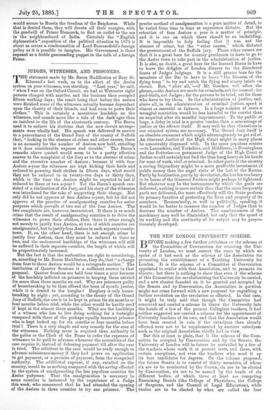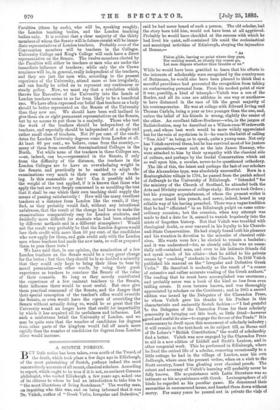THE NEW LONDON UNIVERSITY SCHEME. B EFORE making a few further
criticisms on the scheme of the Committee of Convocation for recasting the Uni- versity of London, we must correct the error by which we spoke of it last week as the scheme of the Association for promoting the establishment of a Teaching University for London. It is the scheme of a Committee of Convocation appointed to confer with that Association, and to promote its objects ; but there is nothing to show that even if the scheme of this Committee for revolutionising the University be carried, and a new charter founded on it be granted and accepted by the Senate and by Convocation, the Association in question might not come forward with a new proposal for engrafting a further revolution on the revolution so effected. In that case, it might be truly said that though the Committee had conceived and carried a scheme to throw the University into the hands of a few of the present Collegiate teachers, it had neither suggested nor carried a scheme for the appointment of University teachers of its own, and that the Association would have been created in vain if the cataclysm then already effected were not to be supplemented by another cataclysm such as the original Association chiefly had in view.
But this at least is plain, that if the scheme of the Com- mittee be accepted by Convocation and by the Senate, the University of London will in future be controlled by a few of the teachers whose work it at present tests, and these, with certain exceptions, not even the teachers who send it up its best candidates for degrees. On the scheme proposed, the future Senate is to consist of thirty members, of whom six are to be nominated by the Crown, six are to be elected by Convocation, six are to be named by the heads of six different bodies, of which three at least are competing Examining Boards (the College of Physicians, the College of Surgeons, and the Council of Legal Education), while twelve are to be elected by what are called the four
Faculties (three by each), who will be, speaking roughly, the London teaching bodies, and the London teaching bodies only. It is evident that a clear majority of the thirty members of whom the Senate will in future consist will be imme- diate representatives of London teachers. Probably some of the Convocation members will be teachers in the Colleges. University College and King's College will each have a direct representative on the Senate. The twelve members elected by the Faculties will either be teachers or men who are under the immediate influence of teachers ; while only the six Crown nominees will be, in general, really independent of the teachers, and they are just the men who, according to the present experience of the University, attend more or less irregularly, and can hardly be relied on to represent any continuous or steady policy. Now, we must say that a revolution which throws the Executive of the University into the hands of London teachers seems to us far from likely to be a beneficial one. We have often expressed our belief that teachers as a body should be better represented on the Senate of the University than they now are. We should have been well inclined to give them six or eight permanent representatives on the Senate, but by no means to put them in a majority. Those who test the work of the teachers should be independent of the teachers, and especially should be independent of a single and rather small class of teachers. Not 20 per cent. of the candi- dates for London University degrees come from London at all. At least 80 per cent., we believe, come from the country,— many of them from excellent denominational Colleges in the North. Yet while none of the teachers in these Colleges are, —or, indeed, can be,—represented in the Senate, if only from the difficulty of the distance, the teachers in the London Colleges are to have an overwhelming weight in the Senate, and practically to be enabled to adapt the examinations very much to their own methods of teach- ing. Is this reasonable or fair Can it possibly add to the weight of the test applied, if it is known that those who apply the test are very deeply concerned in so moulding the test that it shall be one which their own teaching shall supply the means of passing satisfactorily ? How will the many excellent teachers at a distance from London like the result, if they find, as they probably would find, without any intentional unfairness, that the result of the change had been to make the examinations comparatively easy for London students, and decidedly more difficult for students who had been educated by different methods and in a different atmosphere ? Would not the result very probably be that the London degrees would lose their credit with more than 50 per cent. of the candidates who now apply for them, and gain credit only with the London men whose teachers had made the new tests, as well as prepared them to pass those tests ?
We have said that, in our opinion, the nomination of a few London teachers on the Senate would be a very great change for the better ; but then they should be in so decided a minority that they could only hope to bring their ideas to bear by moral persuasion—in other words, by using their great experience as teachers to convince the Senate of the value of their counsels. So long as they merely contributed the experience of a few eminent teachers to the Senate, their influence there would be most useful. But once give them practical command of the Senate, and the danger that their special conception of the teacher's office would override the Senate, or even would have the repute of overriding the Senate without actually doing so, would be so great that the University would no longer have that credit for impartiality by which it has acquired all its usefulness and influence. Let each a misfortune befall the University of London, and we may be quite sure that the number of candidates for degrees from other parts of the kingdom would fall off much more rapidly than the number of candidates for degrees from London alone would increase.



































 Previous page
Previous page